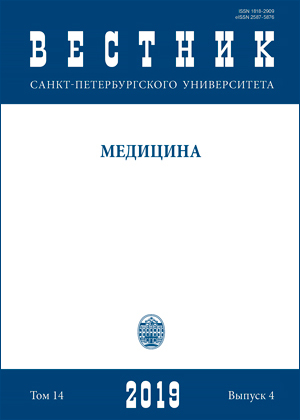NK-cells in placenta of female patients with type 1 diabetes mellitus
DOI:
https://doi.org/10.21638/spbu11.2019.429Abstract
Placenta is a temporary organ that performs multiple functions to provide a normal course of the intrauterine development of the child. However, immune interactions in placenta are not well understood. Since women with type 1 diabetes mellitus have a greater risk of adverse pregnancy outcomes due to aberrant immunological adaptation, the study of immunological interactions in placenta of these women is of particular interest. In this study a comparative analysis of the age-related expression parameters of marker of NK-cells (CD57) in placenta in patients with type 1 diabetes mellitus was performed. The current study revealed differences in the expression parameters of NK-cells marker between two age subgroups of the patients and compared to healthy controls. The results indicate the high significance of inflammatory type 1 diabetes mellitusmarkers in women with type 1 diabetes mellitus for assessing the course of pregnancy and the possible development of somatic pathology in newborns, especially from older women.
Keywords:
type 1 diabetes mellitus, T1DM, pregnancy, NK-cells, autoimmunity in pregnancy
Downloads
References
References
Downloads
Published
How to Cite
Issue
Section
License
Articles of "Vestnik of Saint Petersburg University. Medicine" are open access distributed under the terms of the License Agreement with Saint Petersburg State University, which permits to the authors unrestricted distribution and self-archiving free of charge.




